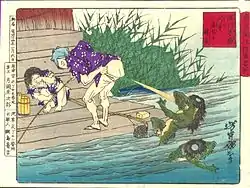屁
| ||||||||
Translingual
Han character
屁 (Kangxi radical 44, 尸+4, 7 strokes, cangjie input 尸心心 (SPP), four-corner 77211, composition ⿸尸比)
References
- KangXi: page 300, character 23
- Dai Kanwa Jiten: character 7654
- Dae Jaweon: page 597, character 1
- Hanyu Da Zidian (first edition): volume 2, page 966, character 12
- Unihan data for U+5C41
Chinese
| trad. | 屁 | |
|---|---|---|
| simp. # | 屁 | |
| alternative forms | ||
Glyph origin
Characters in the same phonetic series (比) (Zhengzhang, 2003)
| Old Chinese | |
|---|---|
| 梐 | *piː, *biːʔ |
| 狴 | *piː |
| 悂 | *piː, *pʰi |
| 螕 | *piː |
| 鎞 | *piː |
| 蓖 | *piː |
| 篦 | *piː, *bis |
| 批 | *pʰiː |
| 砒 | *pʰiː |
| 鈚 | *pʰiː, *bi |
| 磇 | *pʰiː |
| 媲 | *pʰiːs |
| 笓 | *biː |
| 膍 | *biː, *bi |
| 陛 | *biːʔ |
| 仳 | *pʰeʔ, *piʔ, *bi, *briʔ |
| 吡 | *pʰeʔ, *piʔ, *biɡ |
| 紕 | *be, *pʰi, *kʰjɯʔ |
| 比 | *piʔ, *pis, *bi, *bis, *biɡ |
| 妣 | *piʔ, *pis |
| 秕 | *piʔ |
| 沘 | *piʔ, *bi |
| 枇 | *piʔ, *bi, *bis |
| 粊 | *pris |
| 庇 | *pis |
| 屁 | *pʰis |
| 琵 | *bi |
| 毗 | *bi |
| 貔 | *bi |
| 豼 | *bi |
| 蚍 | *bi |
| 芘 | *bi, *bis |
| 肶 | *bi |
| 魮 | *bi |
| 阰 | *bi |
| 坒 | *bis, *biɡ |
| 玭 | *bin |
Phono-semantic compound (形聲, OC *pʰis) : semantic 尸 (“body”) + phonetic 比 (OC *piʔ, *pis, *bi, *bis, *biɡ).
Etymology
From Proto-Sino-Tibetan *pja-n/t/s (“fart; shit”). Cognate with Tibetan ཕྱེན (phyen), འཕྱེན ('phyen, “flatulence”), Jingpho hpyet (“to fart”).
Pronunciation
Definitions
屁
- (colloquial) flatulence; fart (Classifier: 篤/笃 c)
- 放屁 ― fàngpì ― to fart; to bullshit
- (colloquial) buttocks; backside
- (colloquial) to fart; to pass gas
- 屁者先知 ― pìzhěxiānzhī ― [jocular] The farter is usually the first to realise (and complain about the fart).
- (vulgar) rubbish; worthless; useless; insignificant; trivial
- (vulgar, chiefly in the negative) a damn thing; (no)thing; damn all; jack shit; bugger all
- (vulgar, negates the meaning of the sentence) like hell/like fuck; my ass; your ass; damn all/bugger all/fuck all
Compounds
Derived terms from 屁
|
Japanese
Compounds
Compounds
- 言い出しっ屁 (iidashippe)
- 河童の屁 (kappa no he)
- 最後っ屁 (saigoppe)
- 沈香も焚かず屁もひらず (jinkō mo takazu he mo hirazu)
- 透かし屁 (sukashibe)
- 握り屁 (nigiribe)
- 百日の説法屁一つ (hyakunichi no seppō he hitotsu)
- 屁負い比丘尼 (heoi bikuni)
- 屁糞葛 (hekusokazura), 屁屎葛 (hekusokazura)
- 屁放き虫 (hekokimushi)
- 屁っ放り (heppiri)
- 屁でもない (he de mo nai)
- 屁とも思わない (he to mo omowanai)
- 屁の河童 (he no kappa)
- 屁の突っ張りにもならない (he no tsuppari ni mo naranai)
- 放屁 (hehiri)
- 屁理屈 (herikutsu)
- 屁をひって尻すぼめ (he o hitte shiri subome)
- 放屁 (hōhi)
Etymology
| Kanji in this term |
|---|
| 屁 |
| へ Hyōgaiji |
| kun’yomi |
Likely from Old Japanese, ultimately from Proto-Japonic *pya (“flatus, fart”), itself likely an onomatopoeia. First cited to the Shinsen Jikyō, c. 898-901 CE.[1]
Cognate with Proto-Ryukyuan *pe (“flatus, fart”). Compare Middle Chinese 屁 (MC pʰiɪH).
References
- “屁”, in 日本国語大辞典 (Nihon Kokugo Daijiten, “Nihon Kokugo Daijiten”) (in Japanese), 2nd edition, Tōkyō: Shogakukan, 2000, →ISBN
- 2006, 大辞林 (Daijirin), Third Edition (in Japanese), Tōkyō: Sanseidō, →ISBN
- 1998, NHK日本語発音アクセント辞典 (NHK Japanese Pronunciation Accent Dictionary) (in Japanese), Tōkyō: NHK, →ISBN
Korean
Hanja
屁 • (bi) (hangeul 비, revised bi, McCune–Reischauer pi)
- This term needs a translation to English. Please help out and add a translation, then remove the text
{{rfdef}}.
Vietnamese
This article is issued from Wiktionary. The text is licensed under Creative Commons - Attribution - Sharealike. Additional terms may apply for the media files.
